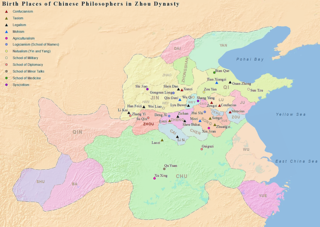Zou Jing, may refer to:
- Zou Jing (Eastern Han), Chinese military officer in the Eastern Han.
- Zou Jing (engineer), Chinese engineer, member of the Chinese Academy of Engineering.
Zou Jing, may refer to:

Han, known in historiography as Shu Han or Ji Han, or often shortened to Shu, was one of the three major states that competed for supremacy over China in the Three Kingdoms period (220–280). The state was based in the area around present-day Hanzhong, Sichuan, Chongqing, Yunnan, Guizhou, and north Guangxi, an area historically referred to as "Shu" based on the name of the past ancient state of Shu, which also occupied this approximate geographical area. Its core territory also coincided with Liu Bang's Kingdom of Han, the precursor of the Han dynasty.

Wu, known in historiography as Eastern Wu or Sun Wu, was one of the three major states that competed for supremacy over China in the Three Kingdoms period (220–280). It previously existed from 220–222 as a vassal kingdom nominally under Cao Wei, its rival state, but declared independence from Wei and became a sovereign state in 222. It became an empire in 229 after its founding ruler, Sun Quan, declared himself emperor. Its name was derived from the place it was based in — the Jiangnan region, which was also historically known as "Wu". It was referred to as "Dong Wu" or "Sun Wu" by historians to distinguish it from other Chinese historical states with similar names which were also located in that region, such as the Wu state in the Spring and Autumn period and the Wuyue kingdom in the Five Dynasties and Ten Kingdoms period. It was called "Eastern Wu" because it occupied most of eastern China in the Three Kingdoms period, and "Sun Wu" because the family name of its rulers was "Sun". During its existence, Wu's capital was at Jianye, but at times it was also at Wuchang.

Cheng can be a transcription of one of several Chinese surnames. Since the syllable Cheng represents different sounds in Hanyu pinyin and the Wade–Giles systems of Chinese romanization, some ambiguity will exist as to which sound is represented by the letters "Cheng" if the romanisation and tone is not known. Also within each system of romanisation, each syllable can represent one of several different characters, as with any Chinese syllable.
The term Nine Provinces or Nine Regions, is used in ancient Chinese histories to refer to territorial divisions or islands during the Xia and Shang dynasties and has now come to symbolically represent China. "Province" is the word used to translate zhou (州) – since before the Tang dynasty, it was the largest Chinese territorial division. Although the current definition of the Nine Provinces can be dated to the Spring and Autumn and Warring States periods, it was not until the Eastern Han dynasty that the Nine Provinces were treated as actual administrative regions.
Zhuge in Chinese, Jegal in Korean, Gia Cát in Vietnamese or Morokuzu in Japanese is a compound surname in East Asia. It is ranked 314th in Hundred Family Surnames in China. The surname has often been synonymous with wisdom in Chinese culture, due to the fame of Zhuge Liang. It originated from a branch of the Ge family, who added a character to their name.

Minyue was an ancient kingdom in what is now the Fujian province in southern China. It was a contemporary of the Han dynasty, and was later annexed by the Han empire as the dynasty expanded southward. Its inhabitants were groups of indigenous non-Chinese tribes called the Baiyue. The kingdom survived roughly from 334–110 BC.
Liu Qi may refer to:
Zou Jing was a military officer who lived during the Eastern Han dynasty of China.
Liu Jing may refer to:
Liu Yu is the name of:
Wang Jing may refer to:
The State of Cao was a vassal state in China during the Zhou Dynasty. The state was founded sometime in the 11th century BC by Cao Shu Zhenduo, a son of King Wen of Zhou and younger brother of King Wu of Zhou. With its capital at Taoqiu (陶丘), the State of Cao covered roughly the area of modern-day Dingtao County, Shandong Province. It was located on the flat country of the North China Plain about 50 miles east of the point where the current course of the Yellow River changes from east to north-east. To the northwest was Wey, to the northeast Lu and to the southeast Song.

The School of Naturalists or the School of Yin-yang was a Warring States-era philosophy that synthesized the concepts of yin-yang and the Five Elements.
He Jing or Jing He may refer to:

The Han campaigns against Minyue were a series of three Han military campaigns dispatched against the Minyue state. The first campaign was in response to Minyue's invasion of Eastern Ou in 138 BC. In 135 BC, a second campaign was sent to intervene in a war between Minyue and Nanyue. After the campaign, Minyue was partitioned into Minyue, ruled by a Han proxy king, and Dongyue. Dongyue was defeated in a third military campaign in 111 BC and the former Minyue territory was annexed by the Han Empire.

Lóu is the pinyin romanization of the Chinese surname written 娄 in simplified character and 婁 in traditional character. It is the 229th most common surname in China, shared by approximately 350,000 people. Lou 娄 is listed 139th in the Song Dynasty classic text Hundred Family Surnames.

Dou is the Mandarin pinyin romanization of the Chinese surname written 窦 in simplified Chinese and 竇 in traditional Chinese. It is romanized Tou in Wade–Giles. Dou is listed 39th in the Song dynasty classic text Hundred Family Surnames. As of 2008, it is the 219th most common surname in China, shared by 380,000 people.
The Way of the Taiping, also known as the Way of the Great Peace, was a Chinese Taoist movement founded by Zhang Jue during the Eastern Han Dynasty. Its adherents all around China participated in the Yellow Turban Rebellion of 184, with the rebellion being suppressed within the same year by the Eastern Han government. The religious movement was greatly reduced and died soon afterwards. The Way of the Taiping was one of the two largest movements within early Taoism, with the other being the Way of the Five Pecks of Rice. During the reign of Emperor Ling of Han, the movement was recorded to have been popular in eight Provinces: Qing Province, Xu Province, You Province, Ji Province, Jing Province, Yang Province, Yan Province, and Yu Province.。
Lu Commandery was a Chinese commandery that existed from Han dynasty to Tang dynasty. It was located in present-day southern Shandong province.
Zou Jing was a Chinese engineer specializing in photosensitive materials, and an academician of the Chinese Academy of Engineering. She was a delegate to the 8th National People's Congress and a member of the 9th National Committee of the Chinese People's Political Consultative Conference..